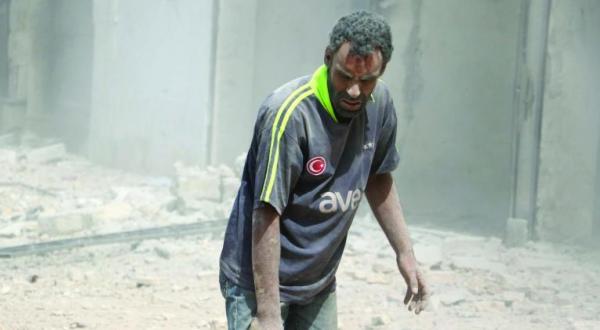It was almost a month ago that retired Major-General Mohsen Rezaei, a former Commander of the Islamic Revolutionary Guard Corps (IRGC), suddenly appeared in public wearing full military uniform and lots of decorations to announce that he was returning to “active service.”
Everyone wondered what all that meant for a man who had left the military to build a political career that included two unsuccessful attempts at winning the presidency of the Islamic Republic.
“What persuaded General Rezaei to seek a new military career?” an analyst at the FARS news agency run by the Islamic Revolutionary Guard Corps wondered at the time.
Part of the answer came last Tuesday when Rezaei told a hastily arranged press briefing in Tehran to express his “anger, sorrow and dismay about Iran’s heavy losses in the latest battles around Aleppo, the war-torn Syrian city. “Their martyrdom shall not remain unavenged,” he said. “We will liberate Aleppo soon and wipe out the takfiri terrorists.”
Since Rezaei had no officially announced position within the military hierarchy, it wasn’t quite clear on whose authority he was making those promises.
A hint of an answer came on Thursday with the buzz that the former commander of the IRGC had been appointed as Military Adviser to the” Supreme Guide” Ayatollah Ali Khamenei.
The buzz started almost at the same time as reports, unconfirmed officially, that Khamenei had asked General Qassem Soleimani, the man who heads the Quds (Jerusalem) Corps and is in charge of “exporting revolution” to step aside. To counter those reports, Soleimani, a master of public relations, launched a hashtag “Soleimani is in Aleppo” to calm at least some of his critics.
The official news agency IRNA ran a front-page story claiming that Soleimani’s hashtag had “terrorized the takfiris.” However, the general, known for his PR stunts and “selfies” published on websites was firmly in Tehran yesterday.
Due to the byzantine nature of Iranian politics, it is not always easy to know what is actually going on. “It is possible that they spread the news of Rezaei taking overall command in Syria to improve morale in the Iranian military, badly shaken by recent heavy losses,” says analyst Hassan Bassir. “The authorities may also be sending a reassuring signal on the eve of planned funerals for martyrs in more than a dozen cities tomorrow.”
In the past few weeks, Rezaei has been consulting with a range of military commanders and political advisers, initially to prepare a report for the “Supreme Guide” on the state of the various paramilitary groups that Iran has created in Arab countries, notably Hezbollah in Lebanon, Hashad Al-Shaabi in Iraq and a number of similar groups in Syria. Since all those paramilitary units are under Soleimani’s command, it was clear that Khamenei wanted an outsider’s assessment of the “selfie” general’s performance.
“All of Soleimani’s “children” have sustained big loses in recent months but achieved little,” says Massoud Vaziri an analyst on paramilitary operations. “The Lebanese Hezbollah’s fighting units have been decimated and are no longer capable of pursuing what is a low intensity war with no end in sight.
The Fatimyoun Brigade, a mixture of Afghani, Pakistani, and Iraqi Shiite volunteers, has lost so many men that it can no longer be regarded as a credible fighting unit.
Rezai was an engineering student when he joined Ayatollah Khomeini’s revolution in 1978. In 1979 he joined the newly created Islamic Revolutionary Guard Corps and, a year later, enlisted to fight in the Iran-Iraq war. After only 18 months in the war he was appointed Commander in Chief of the IRGC at the tender age of 27. He remained IRGC’s chief for almost 17 years, building it into a veritable parallel army with its own air force, navy Marines and airborne commando units.
Rezaei, whose full name is Rezaei-Mir Qa’ed, was born in 1954 in Bonehdar Baba Ahmadi, a remote village in the Zagross Mountains in the southwestern province of Luristan where warlike tribes teach their sons to mount a horse and shoot from the age of four.
However, General Rezaei has tried to cultivate his image as a thinking general, seldom losing an occasion to remind everyone that he holds a doctorate in political science, obtained after his retirement.
According to Hussein Kanani-Moqaddam, a former IRGC commander and a friend of Rezaei, the retired general wrote a letter to Khamenei last April asking the “Supreme Guide” to let him return to military service. “The supreme leader accepted Rezaei’s request to rejoin the military without a specific assignment,” he says.
Rezaei, however, believed that he was coming back with specific aims. In a statement published by his website TBANAK, he wrote: “The next decade in the region will be turbulent, which is why I asked the supreme leader to pass my experiences to the next generations. We need power for the sake of security in the region.”
If confirmed, Rezaei’s arrival as coordinator of Iran’s military efforts in Syria will confirm two points. Firstly, Iran is no longer prepared to play second-string in Syria and will insist on planning, commanding and executing operations where its forces are involved.
Secondly, Iranian leaders have understood that the relatively easy way in which they seized control of Lebanon through Hezbollah isn’t applicable to either Syria or Iraq where more and more massive direct Iranian military involvement may be required. And that, in turn, would require a pair of safe hands, like Rezaei’s, as opposed to Soleimani’s smoke-and-mirror expertise.
